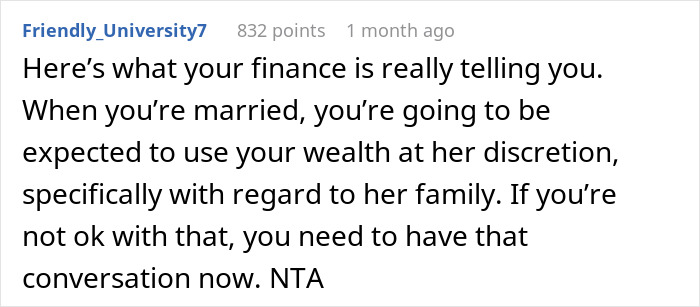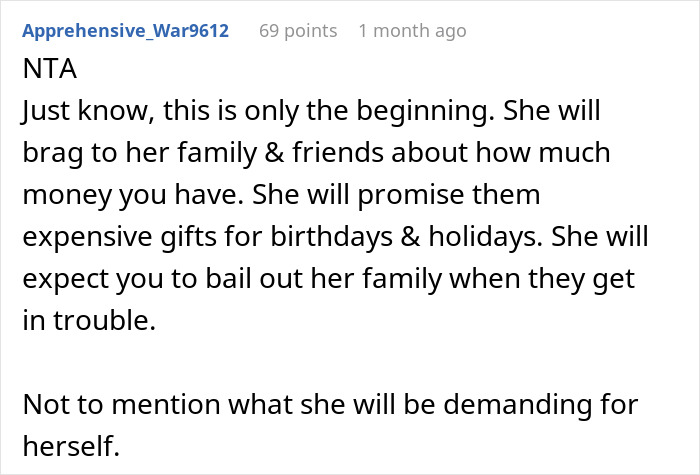Have you ever carefully planned the ultimate gift, thinking you’ve nailed it? A gesture so thoughtful, so generous, however, instead of joy, you might get confusion or worse—outright disappointment. That “perfect” gift you imagined turns out to be someone else’s worst nightmare.
Today’s Original Poster (OP) recently shared his puzzling predicament. Despite doing well financially, he never thought his choice of wedding gift for his fiancée’s brother would cause friction and snowball into a potential relationship red flag.
More info: Reddit
Sometimes, the gift you believed to be thoughtful could earn you a “what were you thinking?”—and in this case, a $2,000 prepaid credit card was the problem

Image credits: Millenary Watches / Unsplash (not the actual photo)
The author bought his brother a Rolex as a wedding gift, and then his fiancée started making comments about how much her brother loves them, too
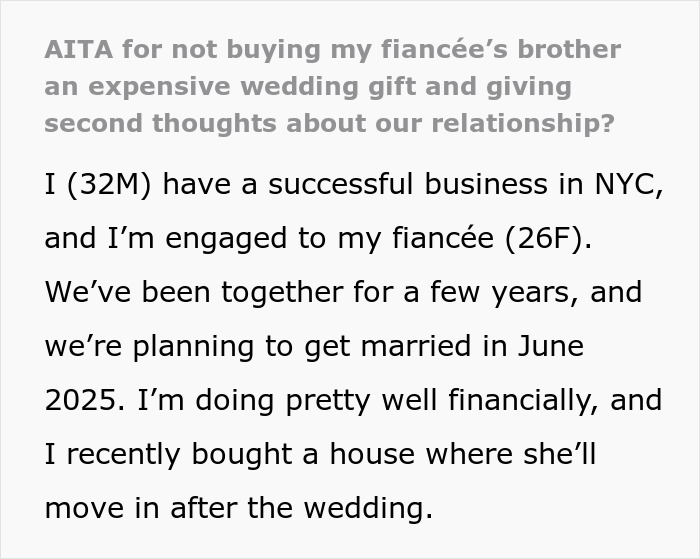


Image credits: FAZJLU

Image credits: Yash Parashar / Pexels (not the actual photo)
For his fiancée’s brother’s wedding which took place recently, the author gifted him a $2,000 prepaid credit card, and that made his fiancée very upset


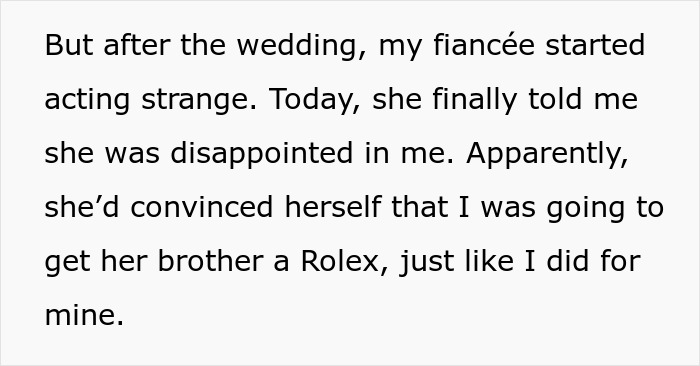

Image credits: FAZJLU

Image credits: cottonbro studio / Pexels (not the actual photo)
The author’s fiancée expressed her disappointment in him and called him “cheap” for not getting her brother a gift as expensive

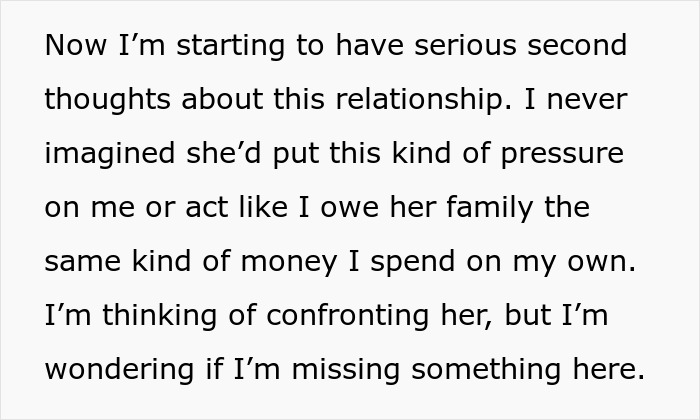

Image credits: FAZJLU
His fiancée’s reaction to the gift he got her brother has left him surprised and he is now having doubts about their relationship
To set the stage, the OP is a successful businessman who does well financially. He has a fiancée who he plans to get married to, and has even gone ahead and bought a house for them to move into once they get married. However, the OP also has a tight bond with his younger brother, calling him his best friend.
Earlier this year, the OP celebrated his brother’s wedding by surprising him with a Rolex he’d been wanting for some time—this watch cost around $20,000. The gift was more on the sentimental side due to the love the OP has for his brother, and naturally, this left the brother ecstatic.
Fast forward to his fiancée’s older brother’s wedding, and things took a different turn. Rather than opting for something equally extravagant, the OP went with a $2,000 prepaid credit card, intending to help fund the couple’s honeymoon. It was thoughtful, practical, and undeniably generous by most standards.
But here’s the twist: the OP’s fiancée was upset. Apparently, leading up to her brother’s wedding, she had dropped hints about how much he loved Rolexes. She had even suggested to friends and family that her fiancé might buy one.
When the watch didn’t materialize, she saw the $2,000 gift as a “cheap” alternative that didn’t match the thoughtfulness and expense of the one he gave his own brother. This sparked an argument that left the groom-to-be both shocked and questioning their relationship.

Image credits: freepik / Freepik (not the actual photo)
If there’s one thing glaring from the OP’s situation, it’s his fiancée’s entitlement. Entitlement, often subtle at first, can grow over time in a relationship, especially as partners become more comfortable with each other.
According to The Mend Project, entitlement is one of the five pillars of abuse and can manifest in various ways, including financial expectations. While it’s normal for couples to compromise and navigate shared finances, problems arise when one partner becomes domineering or expects their wants to be prioritized unreasonably.
Building on the concept of entitlement in relationships, it is essential to address it to maintain a healthy dynamic. Relationship coach Jordan Gray, on his website, provides the steps that can be taken to work through entitlement issues that couples may be dealing with.
“Without being accusatory, dramatic, or unkind, tell your partner that you have been perceiving a pattern of potential entitlement,” he wrote, emphasizing that this should be done with compassion and self-responsibility.
He further advised that it is important to be transparent about the emotional or psychological toll their actions have taken on you. For example, the OP could mention that he is now having second thoughts about their relationship.
Finally, he wrote that it is mostly important to end the conversation with a clear, proactive request for specific changes in behavior. “Name what you would like to see happen,” he advised, as doing this keeps the other partner accountable and enables both partners to work through it without unnecessary conflict.
Netizens also largely agreed that the OP is not in the wrong, with many suggesting that his fiancée’s behavior is a major red flag and that her entitlement could escalate after marriage.
Several users also pointed out that his $2,000 gift to his fiancée’s brother was generous, especially given the difference in relationships between the two brothers.
Do you think the fiancée’s reaction is a sign of deeper issues in the relationship? What would you do if you were in the OP’s shoes? Please let us know your thoughts!
Netizens believe that this situation is indicative of deeper issues and some are suggesting that the author make his fiancée sign a prenup after marriage


